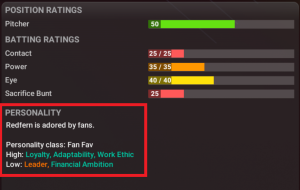Player Personalities
Players in OOTP have six different personality ratings that come into play in various ways. Personality ratings use the same scale as other player ratings. In general, higher personality ratings are better. The one exception is Greed, in which a lower score is better (for the GM).Personality ratings aren't exact. On the Player Profile, you can get some clues as to the player's personality:
There is no default view with personality ratings, but you could easily create a custom view with these ratings. When viewing personality traits in a view, traits are rated on a three-level scale: Low, Normal, and High.
The 11 personality ratings are as follows:
- Leadership - A player's ability to lead. Players with high leadership have some positive effect on other players in the clubhouse, potentially affecting both their performance and their development.
- Desire for Winner - How important it is for a player to be on a winning team. Players who need winning teams factor this into their decisions about where to sign contracts or extensions. Player morale can suffer greatly if this rating is high and the team is performing poorly.
- Loyalty - How loyal a player is to his current team. Players with high loyalty may be more likely to sign extensions.
- Financial Ambition (Greed) - How greedy the player is. Greed is a strong factor in contract negotiations, and can have a negative impact on morale if the player feels he is underpaid.
- Work Ethic - How strong the player's work ethic is. Players with a strong work ethic can have a positive effect on other players in the clubhouse, and can influence player development. They are also somewhat less prone to slumps.
- Intelligence - How intelligent the player is. Intelligent players have a positive effect on other players in the clubhouse, and can influence in-game decisions and player development.
- Adaptability - the players ability to adapt. It can impact learning a new position, or their desire to play in a lower league, how well they adjust to being promoted to a higher league, and other situations where they may be pushed outside of their norm, and can influence player development..
- Controversy, Handle Success, Handle Failure, and Handle Critics - These ratings mostly tend to be how players get categorized into the various player classes, but can also be how they adapt to various situations regarding team chemistry. Is a player going to be Outspoken? A Sparkplug? Will they be a positive influence in the locker room or will they cause disruption?
Note: The effects of personalities are unpredictable, just as in the real world. Personalities might affect the game in ways other than what is described above, and personalities are not absolutes! For example, a player with a high loyalty might elect not to sign an extension with your team. Players will not always behave precisely according to their player personalities.
Disabling the Player Personality Model
The player personality model can be disabled entirely during game creation in the Player Options section of the Game Options page, or after game creation by navigating to Game >> Game Settings >> Players & Team under the Player Personality Settings. By unchecking "Use Player Personality Ratings" it will disable player personality.
Other Player Personality Settings

- Show Player Personality Ratings on Profile Page - By checking this option it will enable showing personality ratings on the player profile. As seen in the picture to the right.
- Show & Use Player Morale System - By unchecking this option it will disable the player morale system. See Player Morale
- Show & Use Team Chemistry System - By unchecking this option you will disable team chemistry. See Team Chemistry for more information.
- Show Player nicknames - This option will just enable or disable seeing player nicknames on the player's profile.
